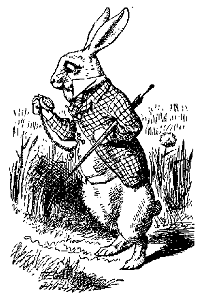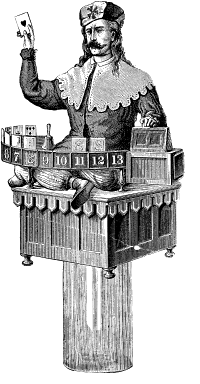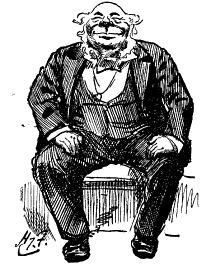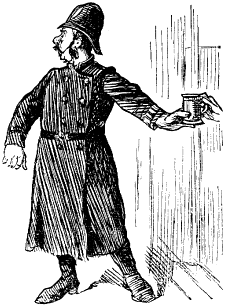|
Issue of July 5, 2006 Page Two |
 |
|
Issue of July 5, 2006 Page Two |
 |
|
Dear Word Detective: My daughter's 5th grade teacher uses the word "member" when he is telling the class to put something into their memory for the first time. He uses the word "remember" when he is asking them to pull a fact out of their memory that has already been placed there. It seems he even stops himself at times and changes the word he is using to fit this definition: "Remember, class . . . oops, I mean member .... " This came about when they were learning about the prefix "re." My question is this: Am I right in being afraid? I cannot locate any use of the word "member" that comes remotely close to this. -- Marti Walsh.  Be afraid. Be very afraid. No, I'm just kidding. I've always wanted to use that in a column. You have nothing to fear in this situation except the transitory influence of a teacher with a serious case of the cutes. It's unlikely that your daughter will suffer any lasting linguistic damage, especially because she's unlikely to meet anyone else in her life who uses "member" in that way. As for the teacher, one can only hope that he knows that "member" as a verb exists today only as a colloquial form of "remember" ("I gave him to you, once before -- 'member? --before he was born." -- M. Mitchell, "Gone with the Wind"). In the beginning was the Proto-Indo-European root "men," which meant "to think," and which eventually gave us a wide range of English words, including "mind," "mental," "comment," "memorable," "commemorate," "memorandum" and similar words. Before we go any further, let me point out that our English noun "member," meaning "constituent part of something," especially "part of the body," comes from an entirely different root, the Latin "membrum," meaning "limb or organ" (which also gave us "membrane"). The Latin word "memor" meant "to be mindful," and its derivative "rememori," meaning "to be mindful again" or "to recall to mind," eventually, via the Old French "rememberer," gave us our English word "remember" in the 14th century. There was, from about the late 14th to the late 16th centuries, an English verb "to member," meaning "to be mindful of, to mention, to remember," but it is thoroughly obsolete today and should not be employed to confuse children. In modern usage, we use "remember" to mean both the action of committing a thought to our memory and the act of recalling something from memory.
Dear Word Detective: I'd like to know the meaning behind the phrase "stinking rich." I was told several years ago (while touring a church in Belgium) that it came from the fact that poor people were buried outside the church. The rich were interred inside, in crypts, and when someone in their family died and was to be buried, the stone was rolled away and there was an awful smell -- hence the term "stinking rich." True or false? -- Jo Anne Johns.  Ding! We have a winner! I love stories like this. In fact, my dream is to work as a tour guide and spend my days spinning deranged tales to visitors. I've even done a bit of practice on my own at various museums. The trick is to hang back in the crowd until it's time to raise your hand and ask the guide things like "Isn't it true that the Tyrannosaurus Rex was named after Rex Harrison because he was the biggest movie star at the time?" and "Aren't they called baseball 'bats' because they were originally used to kill real bats?" Sometimes the guides say they're not sure I'm right, but I know they're secretly planning to use my stories themselves. The story you were told is a classic of the tour-guide fable genre, involving as it does two of the prime topics of a modern legend: death and money. It also boasts a nifty "gotcha," in this case a post-mortem reversal of fortune for the rich folks whose fancy-schmancy burials ironically end up exposing them to embarrassment and disgust. Interestingly, the word "stink," adopted from a Germanic root, did not originally connote an unpleasant aroma. In Old English, it meant to emit a smell of any kind, pleasant as well as unpleasant. Fairly quickly, however, "stink" narrowed to mean "to give off a strong offensive smell," and by the 13th century "stink" took on the figurative meaning of simply "to be very offensive," a sense still in use in such phrases as "My job stinks." "Stinking" seems to have skipped the stage when it might have meant "smelling good." From simply meaning "smelling bad," it became what the Oxford English Dictionary calls a "vague epithet connoting disgust and contempt" in the 13th century, when one person might speak of another's "stinking pride." But it wasn't until the 19th century that "stinking" became a negative intensifier meaning "offensively" in phrases such as "stinking drunk" and "stinking rich," the latter of which is first found in print in 1945. In the case of "stinking drunk," the drinker may indeed smell rather foul, but the development of "stinking" as an intensifier is separate from that fact. The actual smell is just a sort of bonus.
Drop the Velveeta, Lefty. Dear Word Detective: I grew up in the 1930s, and we were all pretty well behaved kids. Our lawlessness amounted to some Halloween pranks, and the occasional breaking of a street light with a sling shot. When a police car came into the neighborhood, however, we acted as if they were after us for some terrible crime, and the cry went out "Cheese it, the cops !" What is the origin of that phrase "Cheese it"? Did it come from gangster movies, or is it some old thieves' cant? My favorite author, Max Shulman, used the term to paraphrase Shakespeare's "Burnham Wood Approaches" by saying, "Cheese it, the copse." -- Art Kambury.  Excellent. A "copse" is, of course, a small forest, and, for the benefit of those who have never read it, in Shakespeare's play "Macbeth," the murderous usurper Macbeth is haunted by a prophecy that he will have nothing to fear until "Burnham Wood comes to Dunsinane." Forests being not notably mobile, Macbeth is somewhat reassured, but still nervous. He's nervous with good cause, as it happens, because when justice finally comes, it's in the form of an army camouflaged with branches gathered from Burnham Wood marching towards Dunsinane, and the murderer Macbeth's goose is cooked. Unfortunately, I fear that I have just murdered Mr. Shulman's fine joke. "Cheese" used as a verb is not something one runs into every day. The oldest sense dates back to the 17th century, when "to cheese" meant simply "to become cheese." This usage is rare today, although I certainly felt as though I was becoming cheese in hour three of the recent remake of "King Kong." You know a movie has jumped the shark when people start applauding the giant slugs. "Cheese" as a verb was also, in the mid-20th century, what the Oxford English Dictionary calls "school slang" meaning "to smile," probably from the classic photographer's instruction to "say cheese." "Cheese it" did indeed arise as thieves' cant, or lingo, meaning "stop what you're doing" or, in the form "cheese it," to run away quickly, to "beat it." It first appeared in the early 19th century, but the derivation of "cheese" in this sense has never been certain. The most logical accepted explanation is that it arose simply as a form of "cease."
And doughnuts. Lots of doughnuts. Dear Word Detective: I am trying to research the origin of the word "healthy." I noticed that it can be divided in two: "heal" and "thy," which made me wonder about the word "heal." Anything you can tell me about "healthy," "health" or "heal" would be most appreciated! -- Michele H.  Well, you've come to the right place. Among my friends, I am known as "Mister Healthy," and my advice on diet and exercise is legendary. Did you know, for instance, that Fritos are a vegetable? The government and the doctors don't want you to know that because they're all pawns of the global lima bean cartel, but it's true. As for exercise, the key thing to remember is that many people overdo it, keel over in mid-jog and wind up taking a dirt nap. Play it safe. If you're feeling torpid, chances are that all you really need is more coffee. Your division of "healthy" into "heal" and "thy" is intriguing, and brings to mind the New Testament (Luke, 4:23), wherein Jesus proclaims "Physician, heal thyself." This is generally good advice, provided one has the proper insurance forms, but really has no connection with the word "healthy." The story of "healthy," "health" and "heal" all begins way back with the Proto-Germanic root word "khailaz," which meant literally "to make whole," and which also eventually gave us our English word "whole." Old English had the derivative "haelan," which also meant "to make whole" with the added sense of "to make well," and which ultimately gave us the English verb "to heal." The word "health" followed a similar path, adding an abstract suffix to denote "the condition of being well and sound." From there, "healthy" meaning "possessing good health" was a snap. So "healthy," "health" and "heal" all spring from the same source, and are every bit as closely related as they appear. There are also, of course, "healthful" and the slightly rarer "healthsome," both meaning "promoting or conducive to bodily health; health-giving, wholesome, salubrious." A few years ago, I received an extremely irate letter from a reader who was apoplectic that I had used the phrase "healthy food" when, he declared, I obviously meant "healthful." The problem, as is so often the case when finer points of usage are debated, is that "healthy" has also meant "conducive to or promoting health" since at least 1552, so that particular boat sailed a long time ago, and getting that worked up over it cannot be healthy.
|
All contents Copyright © 2006 by Evan Morris.